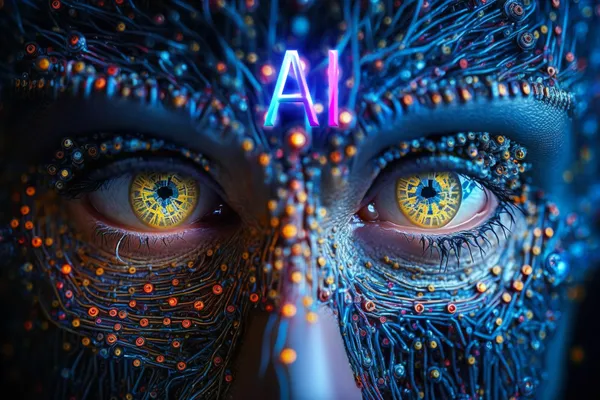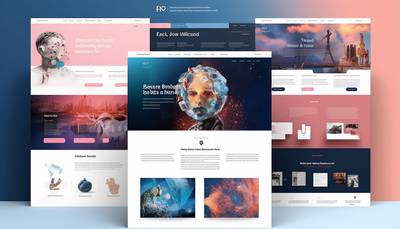Did you know that artificial intelligence (AI) can help you create websites? Almost everyone already knows this to some extent. A lot has happened since GPT 3.5 was adopted with great enthusiasm, and it wasn't that long ago.
AI website development tools offer many features such as automation, content personalization, UX/UI optimization, intelligent chatbots, security and data protection, as well as efficiency and scalability. All this allows you to create a website that is not only attractive to users, but also easy to use and functional.
This article is intended for people who are starting their adventure with business and want to avoid the costs associated with creating a website. Remember, however, that if you can, it is worth commissioning the creation of the website by a specialist.
What you need to know before you start using AI
In the next sections of this article, you will learn about areas where you can use artificial intelligence to create a new website or improve the quality of an existing one. Remember, however, that thoughtlessly generating content or graphics for the website may not be the best idea.
Content generated by AI tools by default is usually poorly suited to a specific audience. No wonder, because how can they know who you want to reach?
If you want your company's website to have a unique image. Start by identifying your audience and the problems they face every day that you can solve. Determine how you want to communicate with your customers and feed this information as context to AI-based tools. The results obtained will be much better.
Basics of AI in website design

The role of AI in UX/UI
AI can help design websites that are more intuitive and easier for users to use. With AI, you can collect data on user behavior such as clicks, navigation and time spent on the page to better understand what elements of the page are most important to users.
Based on this data, you can adjust the content, layout and style of the website to better suit your users' needs. For example, if most users access your website from mobile devices, you can optimize your website
website for mobile devices to provide a better user experience.
You can also use an even simpler solution and export data from the Google analytics installed on the website and ask GPT 4 for a series of steps you need to take to improve the website. It won't be the level of a website optimization expert yet, but with such a low level of difficulty it would be a sin not to try.
Example command:
As an expert who has been involved in website optimization for a long time, analyze the data from Google Analytics that you received in the attached file. Generate a list of steps that, if followed, will significantly improve the quality of my website. The instructions should result directly from the data you have analyzed. I don't want any obvious things or generalities!
AI tools supporting design
- Adobe Sensei uses advanced AI algorithms to improve design processes, automating tasks such as photo retouching, selecting the best parts of video materials, or adjusting project colors. Adobe Sensei intelligence also helps predict design trends, adapting proposals to current user preferences and the latest industry standards.
- Figma , thanks to its AI integration, offers features that enable real-time collaboration and automatic adaptation of designs to different screen sizes. This tool is invaluable for prototyping user interfaces, allowing you to quickly iterate and test solutions without having to manually refine every detail.
- Canva uses AI to provide users with personalized design suggestions based on their previous activities and preferences. Thanks to this, the process of creating graphics, presentations and even websites becomes faster and more intuitive. Canva uses AI to automatically select templates, color palettes, and typography, allowing even people with no design experience to create professional-looking designs.
- Wix ADI (Artificial Design Intelligence) is an example of how AI tools can streamline website development by offering automatic generation of complete websites based on user answers to a series of questions about aesthetic and functional preferences. This tool is perfect for small businesses and individual entrepreneurs who want to quickly launch a professional-looking website.
- DeepArt is another tool that shows the potential of AI in creating unique design. It allows you to create high-quality graphics and images by imitating the style of famous artists or specific artistic trends, which can be used to create unique backgrounds or graphic elements on websites.
All of these tools use artificial intelligence to automate and optimize web design processes, allowing you to design websites faster and more efficiently.
AI in website optimization
Creating websites using artificial intelligence is currently one of the most important tools for website developers. AI in website optimization can help you improve your website's ranking in search results by automating analytical processes and providing precise SEO improvement tips.

SEO and AI
AI is particularly useful in SEO optimization. AI-based tools such as Senuto allow you to identify the most important keywords, analyze competition and adapt content to the current requirements of search engine algorithms. This allows your website to rank higher in search results, which translates into more visits and increased profits.
Content personalization with AI
Thanks to artificial intelligence, you can adapt the content on your website to users' preferences, which will increase their engagement and time spent on your website. AI can analyze users' preferences, behaviors and preferences to provide them with the content that is most interesting to them.
It is worth remembering that AI is a tool that can help you optimize your website, but it will not replace good quality content and an appropriate marketing strategy. At least not yet ;).
Content creation using AI
Creating content for your website can take time and effort, but by using artificial intelligence (AI) you can save time and increase your efficiency. In this section, I'll show you two ways AI can help you create content for your website.
Automatic content generation
One of the biggest challenges when creating content is coming up with content ideas and writing them. AI can help you with this process by automatically generating content based on selected topics and keywords. Tools like GoogleHost's AI content generator allow you to generate content for various types of pages, including home pages, service pages, and other optional pages.
AI in copywriting
AI can also help with copywriting, i.e. writing advertising and promotional texts. Tools such as DiviAI allow you to generate advertising and promotional content based on artificial intelligence. Thanks to this, you can save time and increase the effectiveness of your advertising campaigns.
Remember, however, that the generated content should pass your verification. It happens that the generated text is not at all consistent with the actual situation. Google penalizes sites with poor-quality content, and you don't want to be among the "doomed" sites.
User interactions and AI
Chatbots
One of the most popular ways to use AI to interact with users is through chatbots. Chatbots are programs that allow you to interact with users on your website in a natural and intuitive way.
Chatbots can help users find the information they need, answer questions and solve problems. This allows users to get quick and easy help without
the need to contact customer service.
Remember, however, that this is a more complex aspect that should be outsourced to an external company. Poor bot configuration can result in your warehouse selling out for a fraction of the price.
Product recommendations
Another way to use AI is through product recommendations. By analyzing user behavior on your website, AI can provide personalized product recommendations that are most relevant to a given user. This makes it easier for users to find the products they are interested in, and you can increase your sales.
Data analysis using AI

Web Analytics and AI
Traditional web analytics tools allow you to collect information about website traffic, such as the number of visits, time spent on the website and average bounce rate. However, thanks to AI, you can get much more detailed information. For example,
you can see which elements of the page attract the most attention, which links are clicked the most, and which sections of the page are skipped.
AI can also help identify patterns and trends on a website. For example, if users frequently browse a particular section of the page, you can start experimenting with placing more visible links to that section.
Predicting user behavior
AI can also help with predictive analysis of user behavior on a website. Based on historical data, AI can predict what actions users will take in the future. Thanks to this, you can optimize your website to better meet the needs of users.
For example, if AI detects that users often leave the page on a particular subpage, you can start experimenting with different versions of that subpage to see which version attracts the most users and increases their engagement.
Examples of using AI in practice
1. Content personalization
Thanks to AI, you can adapt the content on the website to the user's preferences. AI algorithms analyze user data such as browsing history, clicks, language preferences and geolocation to offer personalized content. In this way, the website becomes more attractive to the user, which increases the chance of staying on the website and making a purchase.
2. UX/UI optimization
AI can help optimize the UX/UI (User Experience/User Interface) on a website. AI algorithms analyze user behavior on a website, such as time spent on the page, mouse movement, clicks, to optimize the appearance and layout of the website. This makes the website more intuitive and easier for the user to navigate.
3. Intelligent Chatbots
AI can help you create intelligent chatbots on your website. Chatbots use AI algorithms to recognize and answer users' questions. This makes the website more interactive and allows users to get the information they need faster.
Challenges and limitations of using AI in web design

1. Limited customization
AI can help automate website design and coding processes, but it can't always deliver personalized solutions. Typically, AI works based on algorithms and data, rather than individual user preferences.
Therefore, if you want to provide a personalized experience for your users, you need to spend time and effort manually customizing content and functionality.
2. Lack of human touch
Artificial intelligence can help automate many tasks, but it will not replace human creativity and sensitivity. When designing websites, it is important to take into account the human factor so that the website is intuitive, easy to use and aesthetically attractive. AI can help automate certain elements, but it will not yet replace the human hand in website design and development.
3. Costs
It's not talked about much, but the use of AI is not always cheap. Therefore, if you want to use AI in website development, you must take into account the costs associated with purchasing and implementing the appropriate software and staff training.
Summary
Artificial intelligence significantly facilitates website design, offering tools for automating and personalizing content and optimizing UX/UI. Thanks to AI, even beginners can create intermediate-level websites.
Ultimately, however, remember that these are just tools. Use them wisely and be aware that you will still get the best results by entrusting your website to a professional.
Frequently Asked Questions
How can artificial intelligence facilitate the creation of responsive designs?
Artificial intelligence can help create responsive designs by analyzing data related to user behavior on the website. AI can help identify areas that need improvement, as well as generate suggestions for design changes that will improve the user experience.
What are the advantages of using AI in user interface design?
AI can help identify areas that need improvement, as well as generate suggestions for design changes that will improve the user experience. Additionally, AI can help automate the user interface design process, which speeds up time to market.
How does AI contribute to automating the website development process?
AI can help automate the website development process by using machine learning algorithms to analyze data and generate website design suggestions. AI can also help automate processes related to website testing and optimization.
Are there ready-made AI platforms supporting the creation of websites for people who cannot program?
Yes, there are ready-made AI platforms that support the creation of websites by such people. Some of them include Wix ADI, Squarespace, WordPress and many others. Ready-made AI platforms are easy to use and allow you to quickly create websites without the need for programming skills.

Adam Naworski



